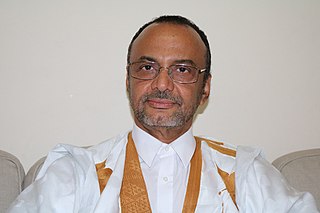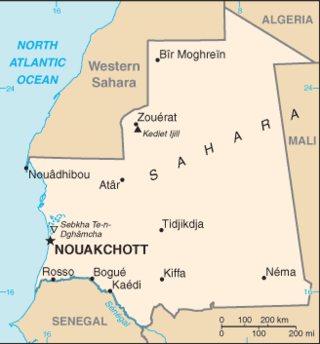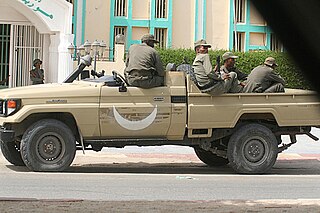| |||||
| Decades: | |||||
|---|---|---|---|---|---|
| See also: | |||||
The following lists events in the year 2017 in Mauritania .
| |||||
| Decades: | |||||
|---|---|---|---|---|---|
| See also: | |||||
The following lists events in the year 2017 in Mauritania .

Mauritania is a presidential democracy, but has suffered from repeated military coups since its Independence in November 1960. For 18 years after independence, Mauritania was a one-party state under Moktar Ould Daddah. This was followed by decades of military rule. The first fully democratic presidential election in Mauritania occurred on 11 March 2007, which marked a transfer from military to civilian rule following the military coup in 2005. The election was won by Sidi Ould Cheikh Abdallahi, who was ousted by another military coup in 2008 and replaced by general Mohamed Ould Abdel Aziz. Mauretania underwent its first peaceful transition of power after the 2019 presidential election, although this was between two presidents of the ruling UPR party and former army generals.

The national flag of Mauritania is a green field containing a gold star and crescent, with two red stripes at the top and bottom of the field. The original national flag was introduced under the instructions of President Moktar Ould Daddah and the constitution of 22 March 1959 and was officially adopted on 1 April 1959.

Elections in Mauritania encompass four different types: presidential elections, parliamentary elections, regional elections and local elections.

Colonel Ely Ould Mohamed Vall was a Mauritanian political and military figure. Following a coup d'état in August 2005, he served as the transitional military leader of Mauritania until 19 April 2007, when he relinquished power to an elected government.

The Military Council for Justice and Democracy was a supreme political body of Mauritania. It served as the country's interim government following the coup d'état which ousted the President Maaouya Ould Sid'Ahmed Taya on 3 August 2005. It was led by the former Director of the national police force, Colonel Ely Ould Mohamed Vall. After seizing power, it quickly pledged to hold elections within two years and promised that none of its own members would run.

Sidi Mohamed Ould Boubacar is a Mauritanian politician who has been Prime Minister of Mauritania twice, from 1992 to 1996 and again from 2005 to 2007.

The Mauritanian Parliament is composed of a single chamber, the National Assembly. Composed of 176 members, representatives are elected for a five-year term in single-seat constituencies.

A military coup took place in Mauritania on 3 August 2005. President Maaouya Ould Sid'Ahmed Taya was ousted by the Armed Forces of Mauritania and replaced by the Military Council for Justice and Democracy (CMJD), headed by Ely Ould Mohamed Vall, while Taya was in Saudi Arabia attending the funeral of King Fahd of Saudi Arabia.
Saleh Ould Hanenna is a former Mauritanian soldier and political figure.
In December 1984, Haidallah was deposed by Colonel Maaouya Ould Sid'Ahmed Taya, who, while retaining tight military control, relaxed the political climate. Ould Taya moderated Mauritania's previous pro-Algerian stance, and re-established ties with Morocco during the late 1980s. He deepened these ties during the late 1990s and early 2000s as part of Mauritania's drive to attract support from Western states and Western-aligned Arab states. Mauritania has not rescinded its recognition of Polisario's Western Saharan exile government and remains on good terms with Algeria. Its position on the Western Sahara conflict has been, since the 1980s, one of strict neutrality.

The 2008 Mauritanian coup d'état was a military coup that took place in Mauritania on August 6, 2008, when President Sidi Ould Cheikh Abdallahi was ousted from power by the Armed Forces of Mauritania, led by a group of high-ranking generals he had dismissed from office earlier that day.

Mohamed Ould Abdel Aziz is a retired Mauritanian military officer and politician who served as the 8th President of Mauritania from 2009 to 2019.

Mauritania, formally the Islamic Republic of Mauritania, is a sovereign country in Northwest Africa. It is bordered by the Atlantic Ocean to the west, Western Sahara to the north and northwest, Algeria to the northeast, Mali to the east and southeast, and Senegal to the southwest. By land area Mauritania is the 11th-largest country in Africa and 28th-largest in the world; 90% of its territory is in the Sahara. Most of its population of some 4.3 million lives in the temperate south of the country, with roughly a third concentrated in the capital and largest city, Nouakchott, on the Atlantic coast.

Presidential elections were held in Mauritania on 18 July 2009. Mohamed Ould Abdel Aziz, who led the 2008 coup d'état, won a narrow first-round majority in the election, according to official results. A second round, if necessary, would have been held on 1 August 2009.

Ba Mamadou dit Mbaré was a Mauritanian politician who served as President of the Senate of Mauritania from 2006 until his death. As President of the Senate, he succeeded Mohamed Ould Abdel Aziz as Head of State on 15 April 2009, when Abdel Aziz resigned to take part in the June 2009 presidential election. Abdel Aziz was then elected president and in turn succeeded Mbaré on 5 August 2009.

The High Council of State was the supreme political body of Mauritania. It served as the country's interim government following the coup d'état which ousted the President, Sidi Ould Cheikh Abdallahi on August 6, 2008. It was led by General Mohamed Ould Abdel Aziz. After seizing power, it quickly pledged to hold elections "in the shortest possible period". A few days after seizing power, Ould Abdel Aziz named Mauritanian Ambassador to Belgium and the European Union, Moulaye Ould Mohamed Laghdaf, as Prime Minister.

The Union for the Republic was a political party in Mauritania. The party was formed in 5 May 2009 by Mohamed Ould Abdel Aziz after he resigned from the military, to run for President of Mauritania. Aziz resigned as chairman of the party on 2 August 2009 after winning the presidential election, as the President of Mauritania cannot be a member of any party. The party also won 13 of the 17 seats up for re-election to the Mauritanian Senate in 2009, giving the UPR control of a total of 38 of the 53 Senate seats.

A two-part constitutional referendum was held in Mauritania on 5 August 2017, having initially been planned for 15 July. Voters were asked whether they approve of proposed amendments to the constitution. Both proposals were approved by 86% of voters with a voter turnout of 54%.